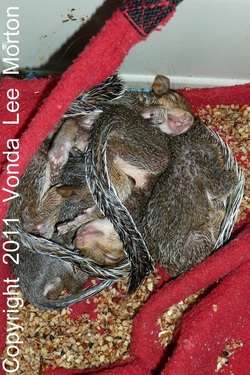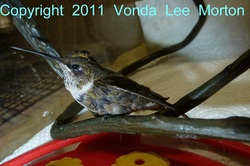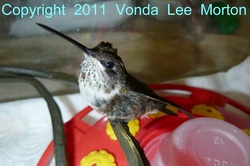


Try getting in a bird covered with food and feces that the finder has been taking "real good care of" for a month, feeding it nothing but cat food and not cleaning it at all, knowing it's illegal to have the bird and waiting until the bird's sibling is dying before attempting to seek help. Make the decision to put down a young owl because someone illegally raised it in captivity, put improper leg restraints on it, and broke both its legs before dumping it in the woods for a hunter to stumble across. Try explaining to the man who just brought you a baby fox—a rabies-prone species—that he & his family, which includes pre-school children, now need to be vaccinated for possible rabies exposure because he kept the fox in the house like a pet for three weeks, while he insists that's not necessary; he *just knows* the fox doesn't have rabies. Then see how much you like people. You'll find that most rehabbers feel the same way, eventually. We see too much of the idiocy in our species. We're spending massive amounts of time, energy and money—mostly our own—to try and mitigate the negative impact people have on wildlife, and the people who bring us animals "respect and admire" us but don't usually help fund us, and all too often, we get the animals after these folks have all but killed them, claiming to be animal lovers in the process. And then there are the ones who refuse—usually rudely—to meet us halfway, since they insist we're state employees and their tax dollars pay our salaries. Salary?? We *pay* for the privilege of working with wildlife; we aren't state or federal employees and get no funding from the state or feds! I make myself available 24/7/365 for the sake of the animals, not for any love of mankind. I've always been misanthropic; wildlife rehab has just heightened that tendency. That said, I'm not rude to the public and I don't name names on the website, no matter how tempted I am in both instances.
And to balance out that negative assessment, let me say that there are those people who do the right thing with no delays. For about every three people who fit the above description, there is one person who helps me retain my miniscule faith in humanity—who, upon finding a bird or animal in need of rehab, immediately sets about seeking that help; who is willing to meet me halfway; and who donates, even if it’s a small amount, toward the care of the animal they’ve brought me. For instance, the person who brought me the hummer found him grounded after morning storms, called around to see who to contact to help him, and got him to me as soon as possible. In addition to agreeing with no hesitation to meet me halfway, this person also made a donation to LWR, assisting in the rehabilitation of Georgia’s native wildlife. Because of this person’s efforts, the hummer was safe from predators and had proper food while he recovered, and the donation will help buy more hummer diet for next year, or fill up the gas tank so I can pick up the next critter needing rehab. Every little donation helps in some way; don’t ever think your donation is too small. I and every other rehabber on the planet need all the financial assistance we can get to continue our efforts to compensate for human encroachment on wildlife habitat, with all its disastrous results.

 RSS Feed
RSS Feed
